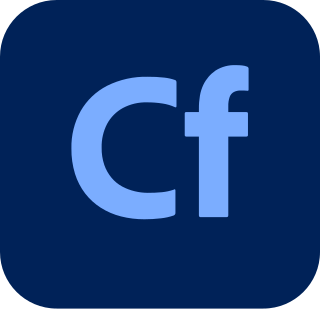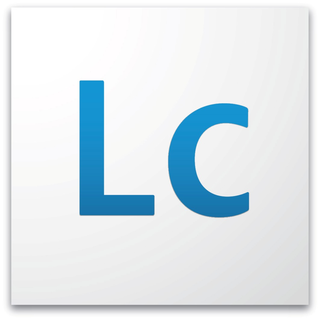
Adobe Photoshop is a raster graphics editor developed and published by Adobe for Windows and macOS. It was originally created in 1987 by Thomas and John Knoll. Since then, the software has become the most used tool for professional digital art, especially in raster graphics editing. Owing to its fame, the program's name has become genericised as a verb although Adobe disapproves of such use.

Adobe ColdFusion is a commercial rapid web-application development computing platform created by J. J. Allaire in 1995. ColdFusion was originally designed to make it easier to connect simple HTML pages to a database. By version 2 (1996) it had become a full platform that included an IDE in addition to a full scripting language.
Quantum Corporation is a data storage, management, and protection company that provides technology to store, manage, archive, and protect video and unstructured data throughout the data life cycle. Their products are used by enterprises, media and entertainment companies, government agencies, big data companies, and life science organizations. Quantum is headquartered in San Jose, California and has offices around the world, supporting customers globally in addition to working with a network of distributors, VARs, DMRs, OEMs and other suppliers.

A laboratory information management system (LIMS), sometimes referred to as a laboratory information system (LIS) or laboratory management system (LMS), is a software-based solution with features that support a modern laboratory's operations. Key features include—but are not limited to—workflow and data tracking support, flexible architecture, and data exchange interfaces, which fully "support its use in regulated environments". The features and uses of a LIMS have evolved over the years from simple sample tracking to an enterprise resource planning tool that manages multiple aspects of laboratory informatics.

Textpattern is a free and open-source content management system (CMS) for PHP and MySQL. It was originally developed by Dean Allen and now developed by Team Textpattern. While it is typically listed among weblogging tools, its aim is to be a general-purpose content management system. The current stable version is Textpattern 4.8.8.
Digital asset management (DAM) and the implementation of its use as a computer application is required in the collection of digital assets to ensure that the owner, and possibly their delegates, can perform operations on the data files.

UltraEdit is a text editor for Microsoft Windows, Linux, and MacOS. It was initially developed in 1994 by Ian D. Mead, the founder of IDM Computer Solutions Inc., and was acquired by Idera Inc. in the August of 2021. Originally called MEDIT, it was first designed to run on Windows 3.1. A version called UltraEdit-32 was later created to run on Windows NT and Windows 95. The last 16-bit UltraEdit program version was 6.20b. UltraEdit-32 was later renamed to UltraEdit in version 14.00. Version 22.2 was the first native 64-bit version of the text editor. Starting with 2022.0, versioning had become year-based.
Enterprise content management (ECM) extends the concept of content management by adding a timeline for each content item and, possibly, enforcing processes for its creation, approval, and distribution. Systems using ECM generally provide a secure repository for managed items, analog or digital. They also include one methods for importing content to manage new items, and several presentation methods to make items available for use. Although ECM content may be protected by digital rights management (DRM), it is not required. ECM is distinguished from general content management by its cognizance of the processes and procedures of the enterprise for which it is created.
DocuShare is a content management system developed by Xerox Corporation. DocuShare makes use of open standards and allows for managing content, integrating it with other business systems, and developing customized and packaged software applications.

digiKam is a free and open-source image organizer and tag editor written in C++ using the KDE Frameworks.

Adobe LiveCycle Enterprise Suite (ES4) is a service-oriented architecture Java EE server software product from Adobe Systems used to build applications that automate a broad range of business processes for enterprises and government agencies. LiveCycle ES4 is an enterprise document and form platform that helps you capture and process information, deliver personalized communications, and protect and track sensitive information. It is utilized for purposes such as account opening, services, and benefits enrollment, correspondence management, requests for proposal processes, and other manual-based workflows. LiveCycle ES4 incorporates new features with a particular focus on mobile devices. LiveCycle applications function in both online and offline environments. These capabilities are enabled through the use of Adobe Reader, HTML/PhoneGap, and Flash Player clients to reach desktop computers and mobile devices.

Big Medium was a browser-based web content management system (CMS) written in the Perl programming language and developed by Global Moxie, the Paris-based company of independent developer Josh Clark.
Documentum is an enterprise content management platform currently developed by OpenText. EMC acquired Documentum for US$1.7 billion in December 2003. The Documentum platform was part of EMC's Enterprise Content Division (ECD) business unit, one of EMC's four operating divisions.
Document Capture Software refers to applications that provide the ability and feature set to automate the process of scanning paper documents or importing electronic documents, often for the purposes of feeding advanced document classification and data collection processes. Most scanning hardware, both scanners and copiers, provides the basic ability to scan to any number of image file formats, including: PDF, TIFF, JPG, BMP, etc. This basic functionality is augmented by document capture software, which can add efficiency and standardization to the process.

TACTIC is a web-based, open source workflow platform and digital asset management system supported by Southpaw Technology in Toronto, ON. Designed to optimize busy production environments with high volumes of content traffic, TACTIC applies business or workflow logic to combined database and file system management. Using elements of digital asset management, production asset management and workflow management, TACTIC tracks the creation and development of digital assets through production pipelines. TACTIC is available under both commercial and open-source licenses, and also as a hosted cloud service through Amazon Web Services Marketplace.
IBM WebSphere Service Registry and Repository (WSRR) is a service registry for use in a Service-oriented architecture.

Adobe Prelude is a discontinued ingest and logging software application for tagging media with metadata for searching, post-production workflows, and footage lifecycle management. Adobe Prelude is also made to work closely with Adobe Premiere Pro. It is part of the Adobe Creative Cloud and is geared towards professional video editing alone or with a group. The software also offers features like rough cut creation. A speech transcription feature was removed in December 2014.
IBM API Management is an API Management platform for use in the API Economy. IBM API Connect enables users to create, assemble, manage, secure and socialize web application programming interfaces (APIs).
Nirvana was virtual object storage software developed and maintained by General Atomics.






